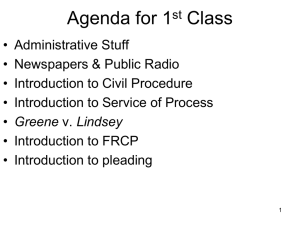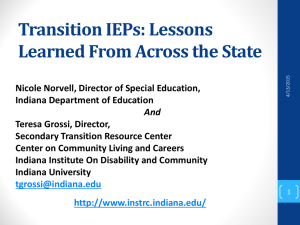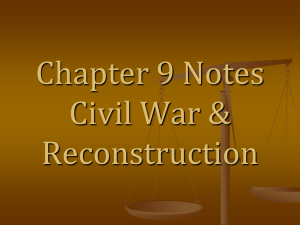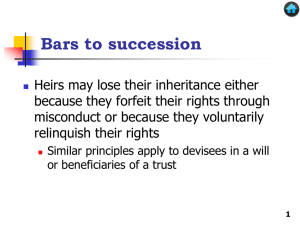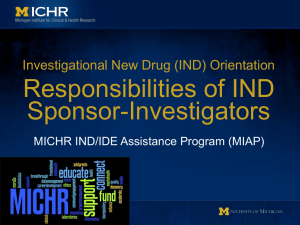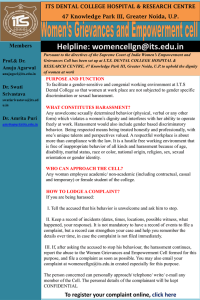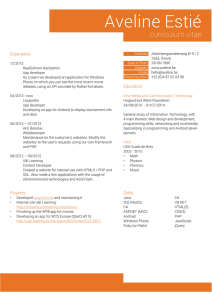PowerPoint - Indianapolis Bar Association
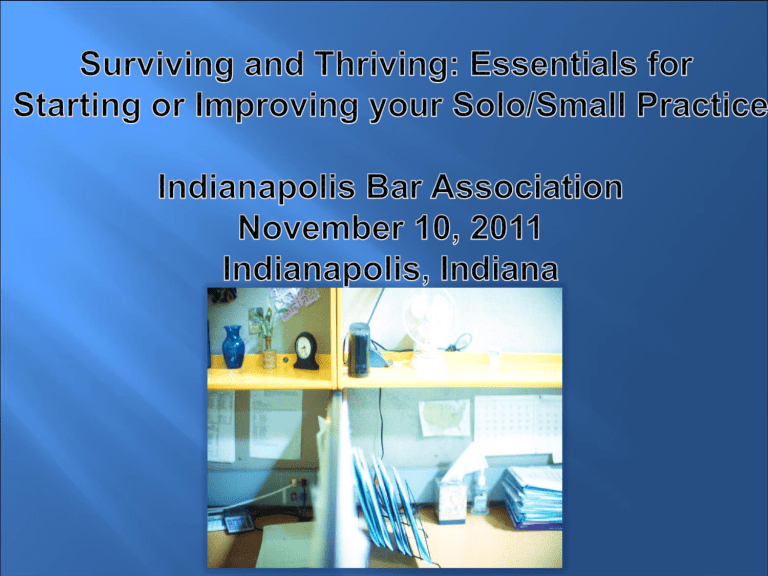
Yasmin L. Stump
YASMIN L. STUMP LAW GROUP, PC
THREE MERIDIAN PLAZA, SUITE 100
10333 NORTH MERIDIAN STREET
INDIANAPOLIS, IN 46290
317.705.0707
yasmin@yasminstumplaw.com
Alexander Jesus Limontes
MITCHELL HURST DICK & McNELIS, LLC
152 EAST WASHINGTON STREET
INDIANAPOLIS, IN 46204
317.636.0808
alimontes@mhdmlaw.com
Rules 4 and 4.1:
mechanics of preparing summons and modes of service to gain personal jurisdiction
Rules 4.2 - 4.10:
service upon particular types of persons and in particular types of action
Rules 4.11 - 4.13:
Effectuating service for each mode of service
Rules 4.14 - 4.17:
general provisions governing proof, validity, and scope of service of process
Personal Jurisdiction, Service of
Summons and Complaint
Ind. T.R. 4(A) provides manner for Court to obtain personal jurisdiction over parties/persons
Court acquires jurisdiction over a party or person who:
Commences/joins in action;
Served with summons or appears; or
Subject to court’s jurisdiction under any other law
Person/legal entity falls within court's jurisdiction in a civil action only when properly made party to that action
Bowmar Instrument Corp. v. Maag , 442 N.E.2d 729 (Ind. Ct. App. 1982)
(quoting Ind. T.R.4(A); Kilb v. Ennis , 74 Ind. 17 (1881))
Accomplished through service of process typicall
Service of process is inadequate, court lacks personal jurisdiction
Bonaventura v. Leach , 670 N.E.2d 123 (Ind. Ct. App. 1996), trans. den.
, 683
N.E.2d 584, overruled on other grounds by Smith v. Johnston , 711 N.E.2d
1259 (Ind. 1999)
Ind. T.R. 4(C) requires that summons contain:
Name and address of person being served;
Name, address and telephone no. of court;
Cause no. assigned to case;
Title of case as in complaint;
May shorten title to first named plaintiff and defendant with indication that additional parties exist if multiple parties
Name, address and telephone no. of attorney for party seeking service;
Time by which person being served has to respond; and
Clear statement that if no response, default judgment may be entered
Additional information to be contained if it facilitates proper service
Ind. T.R. 4(C)
Summons may also designate manner of service
Ind. T.R. 4(D)
When filing complaint or similar pleading must provide clerk with as many copies of complaint and summons as necessary
Clerk must:
Examine, date, sign and affix seal to summons; and
Issue and deliver papers to the appropriate person for service
Praecipe necessary only when further information required to effectuate service
Praecipe must be attached to or entered upon summons
Must include affidavits, requests and any other information related to summons and service
Praecipe then deemed to be part of summons
Separate or additional summons may be issued by clerk upon proper request
Potential manners of service:
Registered or certified mail;
Service on individual at listed address (residence/employment)
Service by sheriff;
Service by service processor;
Service on agent;
Service by publication; and
Service by a party’s appearance
Choice of manner of service may depend upon:
Type of action
Party’s relationship to Indiana
Difficulty in effectuating service
Must provide best possible notice available
Morrison v. Prof. Billing Serv., Inc.
559 N.E.2d 366 (Ind. Ct.
App. 1990)
Ind. T.R. 4 and Ind. TR. 41(E) impose duty of due diligence upon complaining party when securing service of process
Failure to do so result in motion to dismiss for failure to prosecute Taylor v. Lewis , 577 N.E.2d 986, 989 (Ind. Ct.
App. 1991)
Party seeking service may designate manner of service upon summons
Ind. T.R. 4(D)
If not so designated --
Then clerk shall cause service to be made by mail or other public means, provided the mailing addresses are indicated in summons or can be determined
If mailing address not furnished or cannot be determined, or if service by mail or other public means is returned without acceptance –
Then complaint and summons shall promptly be delivered to sheriff who shall serve summons, unless otherwise directed
General rule:
Must serve summons and complaint together unless otherwise ordered by court
Failure to serve complaint with summons prevents court from obtaining personal jurisdiction over party
Overhauser v. Fowler , 549 N.E.2d 71, 73 (Ind. Ct. App.
1990):
Court lacked personal jurisdiction when defendant received summons without complaint attached
Failure to timely issue summons within applicable statute of limitations renders action untimely
See Ray –Hayes v. Heinamann, 760 N.E.2d 172 (Ind.
2002, modified on reh'g, 768 N.E.2d 899
Held: Civil action untimely commenced when plaintiff did not tender summons to clerk after statute of limitations expired, even though complaint filed and filing fee paid within applicable statutory period
No requirement that summons be delivered to defendant within statutory period
Johnson v. Morgan
App. 2007)
871 N.E.2d 1050, 1054 (Ind. Ct.
When serving by publication:
complaint should not be published
instead summons and complaint are deemed to be served at end of the day of last required publication
When serving by party’s appearance:
summons and complaint are deemed to be served at time of appearance in jurisdiction acquired by appearance
Ind. T.R. 4.1(A) -- service on individual/representative may occur by:
Sending copy of summons and complaint by registered/certified mail ;
…or other public means by which written acknowledgement of receipt may be requested/obtained to residence, place of business or employment with return receipt requested and returned showing receipt of letter;
Delivering copy of summons and complaint personally ;
Leaving copy of summons and complaint at dwelling house or usual place of abode ; or
Serving agent as provided by rule, statute or valid agreement
Follow “copy service” with mailed copy
If serving by last 2 options, must send copy of summons ( without complaint ) by First Class U.S. Mail to last known address, and this fact must be shown upon the return
Ind. T.R. 4.1(B)
Registered/certified mail
Often, the fastest, most effective and inexpensive method.
Used extensively in Indiana for serving nonresidents through governmental agents (i.e., nonresident motorists)
Personal service
Classic “hand to hand” service
May be executed by Sheriff or process server
Dwelling house or usual place of abode
Must leave with person of suitable age and discretion residing therein
Harvey, 1 Ind. Prac., Rules of Procedure Annotated R. 4.1
(3d. ed.)
Stated in disjunctive
One’s dwelling house may not be one’s usual place of abode
Agent
Includes “person of suitable age and discretion whose usual duties/activities include prompt communication of such information”
Id.
Service of Particular Individuals and during Particular Causes of Action
Infant or incompetent person
–
Ind. T.R. 4.2
If already represented, service must be made upon next of friend/guardian ad litem
If not yet represented, service must be made on court-appointed rep.
If infant has no court-appointed representative, must serve custodial parent
If no parent, person known to be in position of custodian/parent.
If incompetent person has no court-appointed representative, must serve named party and person known to be custodian
Institutionalized person
– Ind. T.R. 4.3
Service must be made by delivering or mailing copy of summons and complaint to official in charge of institution
Imposes duty upon official to:
immediately deliver copies to person;
permit him/her to make provisions for representation by counsel; and
indicate such upon the return
Applies to nonresidents, former residents or persons/organizations of unknown residence
Submit to jurisdiction of Indiana courts. in any action arising from following acts done by them/their agents:
Doing business in Indiana
Causing personal injury/property damage by act/omission done within Indiana;
Causing personal injury/property damage by act/omission done outside Indiana.
Only if:
Regularly does/solicits business;
Engages in other persistent conduct; OR
Derives subst. revenue/benefit from goods, materials, or services used/consumed/rendered in IN
Supplying/contracting to supply goods/services in Indiana;
Insuring or acting as surety for any person, property or risk within
Indiana;
Owning, using, or possessing real property or interest therein in
Indiana;
Living in martial relationship in Indiana regardless of subsequent departure;
Only if:
Other party to relationship remains in state; and
Related to alimony, custody, child support, or property settlement
Abusing, harassing or disturbing peace of, or violating protective/restraining order for protection of, any person within IN by act/omission done:
in Indiana; or
outside Indiana if part of continuing course of conduct having effect in Indiana
If subject to jurisdiction under Ind. T.R. 4.4 may serve with summons according to:
Ind. T.R. 4.1 (discussed earlier)
Ind. T.R. 4.5 ( see Ind. T.R. 4.9
)
Ind. T.R. 4.6 (discussed later)
Ind. T.R. 4.9 ( in rem actions)
May serve summons:
upon person/agent pursuant to Trial Rules;
if outside Indiana, as provided by Ind. T.R. 4.1;
by publication under Ind. T.R. 4.13
Types of organizations and who to serve:
Domestic/foreign organization
Agent appointed (by agreement or law) to receive service; or
If no agent, executive officer
Partnership
General partner
State governmental organization
Executive officer and Attorney General
Local governmental organization
Executive and organization’s attorney
Manner of service – Ind. T.R. 4.6(B)
Must serve in manner provided by Ind. T.R. 4.1
Must not knowingly direct service at person’s dwelling house/place of abode
Unless address furnished under statutory requirements or valid agreement; or
Affidavit on/attached to summons states that service in another manner is impractical
Service at organization’s office – Ind. T.R. 4.6(C)
If service upon organization cannot be made as provided in Ind.
T.R. 4.6(A) or (B):
May serve by leaving copy of summons and complaint at any office of organization located within Indiana with person in charge of such office
Must show such inability upon affidavit or in the return
Effectuating Particular Manners of
Service
Clerk (or governmental agent under Ind. T.R. 4.10) must send summons and complaint to address supplied upon summons or furnished by person seeking service
Return
Clerk or governmental agent must show:
Date and place of mailing;
A copy of mailed or electronically-transmitted return receipt; and
If and when received by person to show that mailing was accepted/returned
If accepted, by whom
Clerk must file return and receipt with the pleadings, so that it becomes part of the record
If mailing by clerk returned without acceptance, clerk must re-issue summons and complaint for service as requested by person seeking service
Who serves:
Sheriff;
Deputy; or
Person specially/regularly appointed by court
Manner of service available if:
Delivering copy personally; or
Leaving copy at dwelling house/place of employment (Ind. T.R. 4.1)
Service effective if made by person not otherwise authorized by rule, but proof of service by that person must be made as witness or by deposition without allowance of expenses as costs
Duty on server:
Must act promptly and exercise reasonable care to cause service to be made
Person seeking service must:
Submit such request upon praecipe for summons along with affidavits stating that:
Diligent search has been made; and
Defendant cannot be found, has concealed his whereabouts, or has left the state
Must prepare contents of summons to be published
Praecipe for summons by publication
Names all persons to be served
Separate publications for each party not required
Clerk/sheriff must sign summons in such manner as to indicate that it is made by his/her authority
General provisions governing proof, validity and scope of service of process
Duty to make return
Person making service shall promptly make return upon or attach to copy of summons to be delivered to clerk
Form of return
Signed by person making it and include statement that:
If service was made –
That service was made upon person; and
Time, place, and manner of service;
If service was not made –
Manner in which it was thwarted (in terms of fact/law)
Other information as expressly required by Trial Rules
Return and affidavits as evidence
Clerk must file return (along with summons), praecipe, affidavits furnished with summons/praecipe and all other permitted affidavits with pleadings, etc.
At that time, it is a part of the record and has evidentiary effect
Proof of filing and issuance dates
Clerk must enter filing date upon every praecipe, pleading, return, summons, affidavit or other paper filed with or entered of record
Clerk must also enter issuance date upon any summons issued, mailed or delivered by him, or other communication served/transmitted by him
Filing/issuance date constitutes evidence of date of filing
/issuance without authentication when entered in court records, or paper/copy thereof properly admitted into evidence
Admission of service
Written admission stating date and place of service, signed by person being served, may be filed with clerk in order to file with pleadings
Part of record, constitutes evidence of proper service and is allowed as evidence
Amendment of process/proof of service
Court may allow at any time in its discretion, unless clearly and materially prejudices substantive rights of person against whom process issued
Defects in summons
No summons/service thereof will be set aside/adjudged insufficient when reasonably calculated to inform person to be served that:
Action was instituted against him/her;
Name of the court; and
Time to respond
Every person served under Trial Rules must:
Cooperate;
Accept service;
Comply with Trial Rules; and
Acknowledge receipt of papers in signed writing
Only if served personally
If accepting service for another, must:
Promptly deliver papers to person;
Promptly notify person that he holds papers; OR
Within reasonable time, notify clerk/person making service that notice could not be made
Willful violation of Ind. T.R. 4.16 may subject person to contempt proceedings
But person making service cannot subject person being served to penalty/sanction because of service
Procedural prerequisite to initiating tort lawsuit against governmental entity or political subdivision
Indiana Tort Claims Act (“ITCA”), IC 34-13-3, et seq .
Lawsuit barred unless tort claim notice filed within period
Parke County v. Ropak, Inc ., 526 N.E.2d 732, 737
(Ind. Ct. App. 1988), reh’g den .
IC 34-13-3-6, -8, -9, -10 and -12 govern filing and content of tort claim notices
“Governmental entity”:
State of Indiana
State departments, agencies and commissions
Bureau of Motor Vehicle.
“Political subdivisions”:
Community action agency;
IC 12-14-23-2
Individual/corporation providing public transportation per contract w/commuter transportation district created
IC 8-5-15
Volunteer fire dept.
Defined in IC 36-8-12-2 acting pursuant to IC 36-8-17 or contract w/
“unit or fire protection district”
IC 34-13-3-22
Ind. S.Ct. considered issue of whether county equal opportunity council and community services organization “political subdivisions”
Held: Lake County Equal Opportunity Council
(“LCEOC”) was political subdivision, but Greater
Hammond Community Service (“GHCS”) was not
LCEOC political subdivision -“community action agency” under ITCA
Ct. also analyzed entity’s level of public control
GHSC argued governmental entity:
Primarily publicly-funded;
Subject to provisions of Indiana Public Records Act; and
Part of its board consisted of public officials
Ct. rejected GHSC’s argument
If organization is governmental entity under statute other than ITCA -not necessarily one under ITCA
Held: GHSC’s alleged level of public control not significant enough to be
“public” and afforded ITCA protections
If group is neither specifically named by statute as governmental entity/political subdivision nor providing uniquely governmental services, cannot receive ITCA protection by contracting to be managed by established governmental entity
Greater Hammond Comm. Serv. v. Mutka
2000)
, 735 N.E.2d 780, 784 (Ind.
ITCA immunity to governmental entity for tortuous conduct of employees within employees’ scope of employment
Celebration Fireworks, Inc. v. Smith , 727 N.E.2d 450, 452
(Ind. 2000)
Ensures public employees exercise independent judgment necessary to carry out duties without threats of harassment or litigation
Indiana Dept. of Correction v. Stagg , 556 N.E.2d 1338,
1343 (Ind. Ct. App. 1990), trans. Den .
Governmental entity defends all affiliated parties – does not matter whether against political subdivision, its employee or both
Bienz , 674 N.E.2d at 1004 (citing Poole v. Chase , 476 N.E.2d 828
(Ind. 1985))
ITCA provisions do not apply when governmental employee:
Committed criminal act;
Acted outside scope of employment;
Acted maliciously, willfully and/or wantonly; or
Actions were calculated to personally benefit him
IC 34-13-3-5(c)
Tort claim notice would not be necessary in such lawsuits
Significant distinction between claim made against governmental employee in
individual
vs.
official
capacity
Governmental employment alone insufficient to trigger
ITCA’s notice provision
Bienz
, 674 N.E. 2d at 1004.
If plaintiff sues employee in individual capacity, notice required if act/omission causing plaintiff’s loss falls within scope of employment
No tort claim notice required:
Plaintiff actually and reasonably lacks knowledge of governmental employee’s status;
Employee acts in the course of his duties in a manner that disguises governmental employee; or
Employee fails to reveal governmental employee status
Gregor v. Szarmach , 706 N.E.2d 240, 243 (Ind. Ct. App.
1999); see also, Fowler v. Brewer , 773 N.E.2d 858, 866 (Ind.
Ct. App. 2002)
Government may be estopped from asserting defense in such situations
Gregor , 706 N.E.2d at 243
Specific information needed in notice
Format of information need not be complex
Short, plain statements acceptable
IC 34-13-3-10 also requires :
Circumstances which brought about the loss;
Extent of the loss;
Time and place that loss occurred;
Names of all persons involved, if known;
Amount of the damages sought; and
Residence of claimant at the time of the loss and time of filing
Notice suffices if advises “of the accident so that it may promptly investigate the surrounding circumstances.”
Galbreath v. City of Indianapolis , 255 N.E.2d 225, 229 (Ind.
1970)
ITCA also requires tort claim notice to be:
Written; and
Personally delivered/sent by certified/registered mail
IC 34-13-3-12
If notice not written, may suffice under doctrine of
“substantial compliance”
Bd. of Aviation Comm’rs v. Hestor , 473 N.E.2d 151, 154
(Ind. Ct. App. 1985)
Must serve notices against political subdivision on governing body and Ind. Political Risk Mgmt. Commission
(IPRMC)
IC 34-13-3-8(a)
IPRMC is separate body corporate and politic
Instrumentality of state, but not state agency
Separate from state in its corporate and sovereign capacity
Aids political subdivisions in protecting themselves against liabilities
IC 27-1-29-5
If not member of IPRMC, then failure to serve notice excused
IC 34-13-3-8(b)
Must file tort claim notice against governmental entity other than state, its departments and agencies within 180 days after loss occurs
IC 34-13-3-8
Must file tort claim notice against state of Indiana, its departments or agencies within 270 days after loss occurs
IC 34-13-3-6
Filing period is tolled if claimant incapacitated or becomes disabled
IC 34-13-3-9
Period for filing begins to run once incapacity or disability is removed
IC 34-13-3-9.
Incompetency under ITCA refers to incapacity that makes it unreasonable to subject person to duty to file tort claim notice
Indiana Dept. of Hwys. v. Hughes
App. 1991) (citing Lett v. State , 519 N.E.2d 749 (Ind. Ct. App.
1988))
, 575 N.E.2d 676, 678 (Ind. Ct.
Lett v. State , 519 N.E.2d 749 (Ind. Ct. App. 1988)
Claimant was paraplegic
Incompetent for 11 months
Held: When claimant’s condition stabilized and he could operate wheelchair on own, he became competent
Period for filing tort claim notice began to run at that time
Ind. Dept. of Hwys. v. Hughes , 575 N.E.2d 676 (Ind. Ct. App. 1991)
Held: Claimant was never incapacitated
Claimant suffered badly broken leg
Spent 2 months in hospital
During hospital stay, she performed numerous tasks, including:
Paying bills, communicating by telephone and mail, seeing visitors, clearly discussing accident and injuries, signing consent to treat forms and contemplating pursuing legal action
Ct. determined that, while physically impaired, claimant’s ability to perform tasks proved that compliance with ITCA not unreasonable
Courts require strict compliance with ITCA notice requirement, timeliness of notice and submission of notice to proper officers
Daugherty v. Dearborn , 827 N.E.2d 34, 36 (Ind. Ct. App. 2005) (citing Volk v.
Michigan City , 32 N.E.2d 724, 725 (Ind. 1941))
But courts liberally construe ITCA when considering whether notice is sufficiently definite as to time, place, nature, etc. of injury
Id. at 35 (citing Volk , 32 N.E.2d at 725)
Not all technical violations of this statute are fatal to claim
City of Tipton v. Baxter , 593 N.E.2d 1280, 1282 (Ind. 1992) (citing Allen v.
Lake County Jail, 496 N.E.2d 412, 414 (Ind. Ct. App. 1986), reh’g. den.
)
Non-compliance with ITCA excused in three separate and distinct doctrines:
Substantial compliance;
Waiver; and
Estoppel
Substantial compliance
Focus on nature of notice itself
Concerned with extent to which form, content, and timing of notice complies with ITCA
Allen, 496 N.E.2d at 415
Often raised as defense to failure to comply with ITCA’s technical requirements
Waiver
Focus on defendant’s failure to timely raise non-compliance with ITCA as defense
Baxter, 593 N.E.2d at 1282
Estoppel
Emphasis on representations made by defendant or its agents to plaintiff, which induce plaintiff to reasonably believe that formal notice is unnecessary
Id .
It is significant to note that doctrines of estoppel or waiver are typically unavailable to plaintiff who is represented by counsel
Galbreath v. City of Indianapolis , 255 N.E.2d 225 (Ind. 1970)
Ind. S.Ct. explained rationale underlying substantial compliance:
“The purpose of the notice statute being to advise the city of the accident so that it may promptly investigate the surrounding circumstances, we see no need to endorse a policy which renders the statute a trap for the unwary where such purpose has in fact been satisfied.”
Id . at 229
ITCA requirements liberally construed when deciding whether notice requirement satisfied
avoid denying plaintiffs day in court
Held: Notice, which plaintiff’s husband made without an attorney’s assistance, to the City Legal Department sufficient
City attorney had authority to accept notice on behalf of mayor, whom
( according to the notice statute ) proper party to serve with notice in suit against City
Collier v. Prater , 544 N.E.2d 497, 499 (Ind. 1989)
Substantial compliance is question of law, not fact
But determination is fact-sensitive
Held: Significant factor in deciding substantial compliance with ITCA whether claimant conveyed intent to file tort lawsuit against gov’tal entity
Ct. rejected substantial compliance argument because purported “notice” ordinary complaint letter that did not state intent to file claim
Notice substantially complies with ITCA, if:
It is filed within applicable period to file;
It informs municipality of claimant’s intent to make a claim; and
It contains sufficient information that reasonably affords municipality opportunity to promptly investigate claim
Entirely new claims may not be raised in complaint if not mentioned in notice
Simpson v. OP Property Mgmt., LLC , 939 N.E.2d 1098, 1103 (Ind. Ct. App.
2010); see also Boushehry v. City of Indianapolis , 931 N.E.2d 892, 896
(Ind. Ct. App. 2010) (claims in cause of action entirely different than those contained in notice -- prevented notice from substantial compliance)
Substantial compliance applies where claimant satisfied ITCA’s notice provisions in complete absence of writing
Claimants failed to provide written notice to proper authorities
Held: Government’s insurer actually knew of and investigated accident, and had attempted to settle claim
In deposition, government’s insurer testified that he knew:
Date of accident;
Identities of persons involved;
Injuries had occurred and extent of those injuries;
Location of the accident; and
Contact information of claimants
Held: Level of knowledge and reasonable inferences showed substantial compliance with ITCA’s notice provisions
Delaware County v. Powell, 393 N.E.2d 190 (Ind. 1979)
Found that substantial compliance relieved claimant from written notice
Mere actual knowledge of occurrence or routine investigation does not substantially comply, but notice requirement may be waived or substantial compliance may be proven
Held: Lower court erred by failing to permit plaintiff to submit proof of substantial compliance
Several factors if proven may satisfy ITCA notice provisions and constitute substantial compliance:
Preparation of a defense;
Admissions of liability;
Letters describing the accident;
Causes of the accident;
Injuries involved; and
Payments, settlements or other conduct /acts of defendant or its agents
Ind. S.Ct. refrained from extending holding in
Powell
in deciding that claimant had not substantially complied with ITCA notice provisions
Claimant sent ordinary complaint letter to the mayor -
- omitted description of accident or any injuries arising therefrom
Held: Notice to department acting without knowledge and advice of city legal department does not substantially comply with ITCA
Governmental entity can waive defense that plaintiff failed to comply with ITCA notice provisions
Focus on “[D]efendant’s failure to timely raise noncompliance with ITCA as the defense”
Allen, 496 N.E.2d at 415
Primarily governed by Ind. T.R. 12(b) and 8(b).
Waiver must be stated in short, plain terms in responsive pleading to complaint
Statement in responsive pleading that defendant lacked information to form belief about allegation that written notice had been served is insufficient assertion of waiver
Geyer v. City of Logansport , 370 N.E.2d 333, 337 (Ind.
1977); see also Allen , 496 N.E.2d at 415, n.3
Political subdivision must assert defense in answer to complaint
Health & Hosp. Corp. of Marion County v. Gaither , 397
N.E.2d 589, 592 (Ind. 1979)
Although defendant must assert defense in its responsive pleading failure to do so may not be fatal
Allowed defendant to amend answer to include affirmative defense of waiver
Ct. relied on general policy providing for liberal amendment of pleadings, and trial courts’ broad discretion to allow amendments
Fowler failed to assert affirmative defense in original answer, but allowed to amend answer 1.5 years after complaint was filed
Amendment permitted because plaintiff failed to prove undue prejudice if amendment was allowed
Focuses on representations made by defendant or its agents to plaintiff, which induce a reasonable belief that formal notice is unnecessary
Baxter , 593 N.E.2d at 1282
Conduct of defendant or its agents and/or plaintiff may satisfy purpose of ITCA notice provisions
Estops defendant from asserting plaintiff’s noncompliance with ITCA
Powell , 393 N.E.2d at 192
Conduct that satisfies purpose of ITCA includes:
Preparation of defense or admissions of liability;
Letters/writings involving descriptions of the incident, causes and conditions thereof or Nature and extent of the injuries;
Promises, payments, settlements or other conduct/acts of defendant or plaintiff
Crucial issues when considering estoppel:
Whether “governmental unit had actual knowledge of and investigated the accident and surrounding circumstances”
Coghill v. Badger , 418 N.E.2d 1201, 1208 (Ind. Ct. App. 1981)
Court should focus on whether plaintiff actually believed, by way of the government entity’s acts, that formal notice under ITCA was unnecessary
